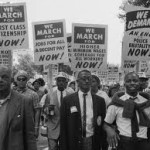What Does History Say About Freedom Of Man
An old English poet says that (ah! freedom is noble thing! freedom makes man to have taste). By the second line, we are to understand that freedom gives man enthusiasm and relish for life. He can enjoy himself. This is almost true. The worker who has a holiday, the schoolboy in vacation t, both say, I am free for a time. They mean that the result and checks of their usual life have been raised for the time being. There are fewer rules to be observed, one has to be at the job at seven thirty am and other has not to be in class exactly on that time.
In early days, it was thought that huge parts of the population could not be free. The poor in early India, the serfs under the feudal system in England, and similar classes were born to serve nobles and landowners. But the nobles were not excused from service, for they had duties and obligations to the king. In some cases, the European king’s owed services to an emperor, and the emperor possibly had to regard the wishes of the pope. The pope was bound strictly by the laws of God, so no man is free.
How could we have a school or a factory in which the attendants or the workers are entirely free? Can we say that a man may come into his work or stay away, just as he likes? Can we say that a school boy may enter his class in time or late, according to his own pleasure? truly not. It would mean a break-down of all organized institutions.
Man lives in a society, a community. He is not solitary. When men are gathered together, there must be discipline. If a number of men are on some work they will get together and elect a captain or a leader, and will submit to him. In a sense they are giving up some of their freedom, because there will be having unity under a leader. Without a leader, there will be disputes and disagreements. In society we have to submit to government, and we elect our leader. There must be law, and it must be compulsory to act upon.
An English writer was a great supporter of freedom. He was an enemy of state control. He found it difficult to settle such questions as, should a man be at independence to drink liquor, or is the state justified in prohibiting it? Writer decided that a man who wants to drink should be allowed to drink, provided that there is nothing in his acts that is a trouble or annoyance to others. In other words, a man can do whatever he likes with his own body and mind but must not intrude on the rights and claims of others. All will not agree with this but may feel that the duty of a good government is to consider the weakness of the poor man, and to prevent him from getting worse. There will always be two schools of thought on this subject.
By Rehana khan(111/10)




